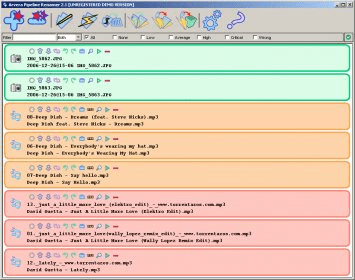

When using the tool to rename emails, you cannot use forbidden characters that cannot be used to name files in Windows and for this reason I have removed the ability to type these into the app.

This tool can be used for various purposes but it was originally developed to allow businesses who drag-and-drop emails into a folder on a shared drive for example and automatically rename all of the emails using information that is contained within an email such as date, sender, receiver, subject, etc.įor example: 1137 Stavrou to Todorov IT Assistance The bulk email renamer tool allows you to dynamically rename Outlook emails in bulk. To speed things up, files that already have the correct name should be moved to a different folder to prevent them from being renamed with the same name. List of filenames from stdin and displays those for editing.Īlternatively, a list of files can be specified on the command line.Note: The app will rename every file in the folder. Note that if "-" is specified as the directory to edit, it reads a Delete lines to remove files from the directory, orĮdit filenames to rename files. These numbers are how vidir keeps track of what When editing a directory, each item in the directory will appear on If no directory is specified, the current directory is edited. Vidir allows editing of the contents of a directory in a text editor.
Mass renamer install#
If the only suitable option is renaming the files manually, a great way to do that is using vidir (in the moreutils package): sudo add-apt-repository universe & sudo apt-get update & sudo apt-get install moreutils Use sudo apt install rename to install it Note: Ubuntu versions above 17.04 don't ship with rename by default, however it's still available in the repositories. If it looks good, press Up to go back, then erase the -n and press Enter (or replace it with -v to output all changes it makes). This will list all changes it would have made, had you not put the -n flag there. It shows what would be renamed, then exits without doing it. I suggest using the -n option when you are not positive you have the correct regular expressions. You just have to be careful about special characters (and spaces). )Īctually, you can even enclose the parts of the string in quotes instead of the whole: 's/Search/Replace/g' is the same as s/'Search'/'Replace'/g and s/Search/Replace/g to BASH.

(But double-quotes and backslashes are used, for example "\n" for a newline, but since "\." isn't a valid back escape sequence, it translates into. Also very important to note, if you are not familiar with BASH, you must put backslashes in SINGLE quotes! You may not omit quotes or use double quotes, or bash will try to translate them.
Mass renamer pdf#
pdf matches qPDF whereas \.pdf only matches the exact string. Will change Something.pdf into Something.doc.

With regular expressions, you can do lots more. If you want case-insensitive, add /i (that would be, /gi or /ig at the end). If you didn't have /g, it would have only done substitution once, and thus now named REPLACE_SEARCH.jpg. The /g means global, so if you had a SEARCH_SEARCH.jpg, it would be renamed REPLACE_REPLACE.jpg. This will replace the string SEARCH with REPLACE in every file (that is, *). It is pretty simple, but hopefully you know basic regex: rename "s/SEARCH/REPLACE/g" *


 0 kommentar(er)
0 kommentar(er)
